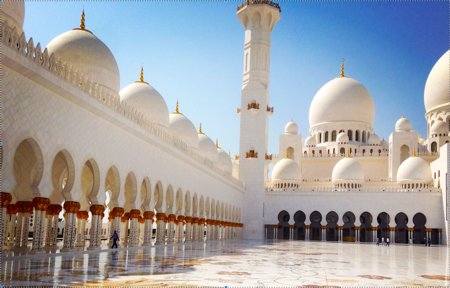The United Arab Emirates is a federation of seven Emirates: Abu Dhabi (the largest emirate and the capital of the UAE), Dubai, Fujairah, Ras al-Khaimah, Shariah and Umm al-Quwain. Dubai, the financial centre and Abu Dhabi, the capital city, are the largest cities.
The country is a study in contrasts. Abu Dhabi and Dubai are exceedingly modern and even ostentatious in their architecture. Glass and steel buildings tower over the cities. Hotels are palatial. Recreational facilities such as golf courses, circuits for racing cars, sandy beaches are designed to attract tourists from the West or the East.
At the same time, if you travel Northeast of Dubai, you will still find traditional fishing villages and old souqs. But a friendly and welcoming atmosphere pervades all of the various regions.
To discover the latest activities and attractions, Explore Abu Dhabi and Explore Dubai provides a wealth of valuable information and recommendations.
About the Culture
The UAE is less conservative than many other countries in the Middle East. International sports and music stars, while on tour, make regular stops. The shopping rivals (and frequently outshines) the most upscale and varied malls in North America and Europe. The social scene in Dubai and Abu Dhabi comes alive at night. The dress code is relaxed, and most people wear what they want—within reason. It’s still a Muslim country so visitors and expats are advised to dress modestly, especially in public places.
Status of Women
The UAE constitution guarantees equal rights for men and women, and women's basic rights are enshrined in Islamic law. Also, the UAE Women's Federation (headed by the wife of the country's president), was founded in 1975 to encourage women to play a full role in society. Emirati women work in a wide range of roles: as civil servants, university professors, teachers, lawyers, engineers, doctors, entrepreneurs, administrators and members of the police force and the army. Expatriate women are found in many parts of the country’s workforce and tend to quickly immerse themselves in all other aspects of Emirates life.
Education
The UAE educational system, which is reserved for Emiratis, ranges from primary level to college and university. School attendance is free for Emirati citizens, including university. Expatriate families may choose to enrol their children in private academic institutions, which often use a British, American, Canadian, or other curricula.
Population
Over 10 million of which approximately 88% are non-nationals from countries throughout the world. Although the various businesses are owned by Emirati nationals, the majority of the day-to-day work is done by expatriates.
Religion
Islam is the official religion of the UAE, but other religions are respected. In the major cities, there are Roman Catholic, Protestant, and/or Orthodox churches to serve the expatriate community.
Currency
In the UAE, the currency is the Emirati dirham (Dh; also AED), which is pegged to the US dollar at a rate of US$1=3.67Dh.
Industry and Economy
Oil was first found in Abu Dhabi in 1958. Since then, the country has undergone a profound transformation, evolving from an impoverished region of desert to a modern state with a high standard of living. In an interest to diversify, much of the UAE's economy is now also based in banking and tourism.
Toursim
Abu Dhabi is very attractive for the more culturally-minded tourist. It is building two museums: a Louvre and Guggenheim. The city seems closer to its old roots in that, in general, the buildings are more subdued or refined, you can still eat fish in an old restaurant along the creek, and it is more management to explore.
Dubai, in contract, is big and flashy, and dominated by extravagant shopping malls, one of which has an indoor ski hill. Dubai is known worldwide for its annual shopping festival which is usually held for 2 weeks in February. In addition to many types of entertainment, outdoor markets, fireworks, and mega-sales, there are many prizes to be won, including luxury cars, gold and cash.
Climate and Topography
The UAE has 1,318 km (818 miles) of coastline, but the majority of the inland area consists of sandy desert, salt flats and gravel plains. The Hajar Mountains, in the east, also run through Oman. Rainfall — the country averages just 12 to 13 cm (5 inches) per year — is irregular and happens mainly in winter. In the major cities of Abu Dhabi and Dubai, the weather is generally sunny, hot and humid. In August, the average high temperature is between 41°C and 48°C (106°F to 118°F), plus humidity. January temperatures average around 24°C (75°F) during the day and dip down to 13°C (56°F) at night.
Working in the UAE
If you’re interested in learning more about working in the UAE, see our Frequently Asked
Questions or Contact Us for more information.

